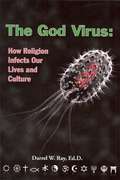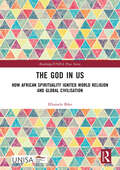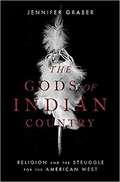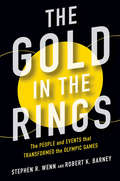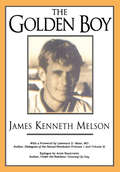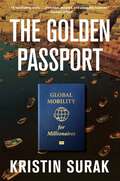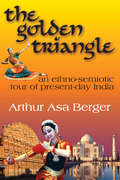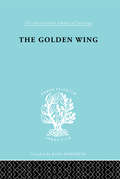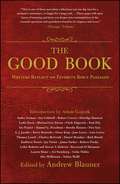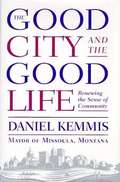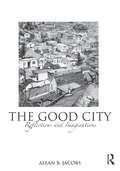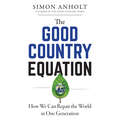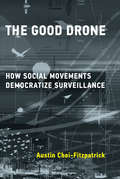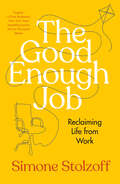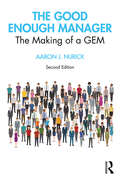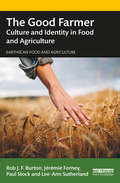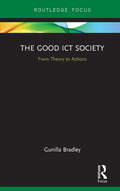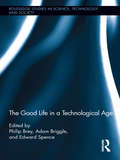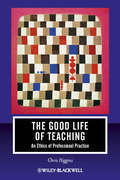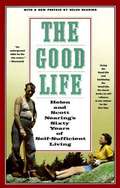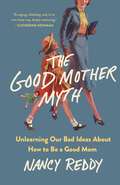- Table View
- List View
The God Virus: How Religion Infects Our Lives and Culture
by Darrel W. RayThe author explores this and much more in his book The God Virus: How Religion Infects Our Lives and Culture. This second-generation book takes the reader several steps beyond previous offerings and into the realm of the personal and emotional mechanisms that affect anyone who lives in a culture steeped in religion.
The God in Us: How African Spirituality Ignited World Religion and Global Civilisation (ISSN)
by Hlumelo BikoThis book traces the unitary source of all of the world’s major religions. The book underscores the fact that there are many ways in which humanity has sought revelation of God, yet there is a common inspiration behind humanity’s God concept.The author’s analysis of world religions or faiths adopts a multi-interdisciplinary approach taking the reader through historical, anthropological, archaeological, and theological viewpoints to make juxtapositions.God in us is a rich resource that helps the readers understand the origins of human civilisation and how humans began to worship God, domesticate animals like sheep, invent astrology and create languages. Biko’s research also delves deeper into unveiling African indigenous knowledge systems and science that predate the arrival of the colonisers on the African soil.Print edition not for sale in Sub Saharan Africa.
The God of Ecstasy: Sex-roles and the Madness of Dionysos
by Arthur EvansOffers a new interpretation of Dionysian tragedy, analyzes Euripides' play, The Bacchae, and looks at what the play implies about the roles of men and women in society.
The Gods Of Indian Country: Religion And The Struggle For The American West
by Jennifer GraberDuring the nineteenth century, white Americans sought the cultural transformation and physical displacement of Native people. Though this process was certainly a clash of rival economic systems and racial ideologies, it was also a profound spiritual struggle. The fight over Indian Country sparked religious crises among both Natives and Americans. In The Gods of Indian Country, Jennifer Graber tells the story of the Kiowa Indians during Anglo-Americans' hundred-year effort to seize their homeland. Like Native people across the American West, Kiowas had known struggle and dislocation before. But the forces bearing down on them-soldiers, missionaries, and government officials-were unrelenting. With pressure mounting, Kiowas adapted their ritual practices in the hope that they could use sacred power to save their lands and community. Against the Kiowas stood Protestant and Catholic leaders, missionaries, and reformers who hoped to remake Indian Country. These activists saw themselves as the Indians' friends, teachers, and protectors. They also asserted the primacy of white Christian civilization and the need to transform the spiritual and material lives of Native people. When Kiowas and other Native people resisted their designs, these Christians supported policies that broke treaties and appropriated Indian lands. They argued that the gifts bestowed by Christianity and civilization outweighed the pains that accompanied the denial of freedoms, the destruction of communities, and the theft of resources. In order to secure Indian Country and control indigenous populations, Christian activists sanctified the economic and racial hierarchies of their day. The Gods of Indian Country tells a complex, fascinating-and ultimately heartbreaking-tale of the struggle for the American West.
The Gods of Greece and Rome (Dover Books On Anthropology, Folklore And Myths)
by Talfourd ElyThe deities of the ancient world — from the famous denizens of Olympus to anonymous river nymphs and sea monsters — come to life in the pages of this classic guide. Richly readable, informative, and colorful, it is drawn mostly from the great epics of Homer and the works of Apollodoros, an Athenian scholar of the second century B.C. Not only does it define the myths in terms of their influence on Western literature, it also depicts the role of the deities in everyday life, from the earliest tribal rites to the grand festivals at the height of Graeco-Roman civilization.Each of the primary and minor gods receives an individual chapter that recounts both the Greek origins and the later Roman adaptation. Profiles of less-familiar figures from the ancient pantheon include the Dioscuri, better known as Castor and Pollux, the patrons of athletes and sailors; Aesculapius, the god of health and healing; Rhea, the mother of the gods; and Pan, the frolicsome woodlands god. No finer survey of classical mythology exists than this instructive and entertaining guide to the gods.
The Gold in the Rings: The People and Events That Transformed the Olympic Games (Sport and Society)
by Stephen R Wenn Robert BarneyOnce a showcase for amateur athletics, the Olympic Games have become a global entertainment colossus powered by corporate sponsorship and professional participation. Stephen R. Wenn and Robert K. Barney offer the inside story of this transformation by examining the far-sighted leadership and decision-making acumen of four International Olympic Committee (IOC) presidents: Avery Brundage, Lord Killanin, Juan Antonio Samaranch, and Jacques Rogge. Blending biography with historical storytelling, the authors explore the evolution of Olympic commercialism from Brundage's uneasy acceptance of television rights fees through the revenue generation strategies that followed the Salt Lake City bid scandal to the present day. Throughout, Wenn and Barney draw on their decades of studying Olympic history to dissect the personalities, conflicts, and controversies behind the Games' embrace of the business of spectacle. Entertaining and expert, The Gold in the Rings maps the Olympics' course from paragon of purity to billion-dollar profits.
The Golden Boy
by Robert HatchThis is the first autobiography to be published by The Haworth Press.This is the first autobiography to be published by Harrington Park Press.The place is New York City. The time is the decade before the plague of AIDS. Thousands of gay men were living a free-wheeling lifestyle of club hopping, “score” hunting, sex without fear, and upward mobility. To none did The Big Apple offer greater rewards than to those young men who had the envied “male model” look.Author James Melson belonged to this exclusive clique: he was tall, blond, muscular, and very “straight looking.” He was a model at 19, and by 25, was a highly successful Wall Street banker. His good looks offered him immediate entry into exclusive clubs and onto the sexual fast track with actors, male models, and other members of the “Clique.”The author brings you behind the scenes into the lifestyle of the handsome “Clique”--providing details of the vigorous and entertaining excitement of the times. He exposes--for one of the few times in print--the lesser-known attitudes of the “Clique” and their disdain for “ugly faggots,” their obsession with strictly the chic and glamorous, and the fast lane life of partying and sex.For 200 pages, the reader is brought back to the era that for many older readers is just a memory, and for younger readers a time they never knew--when to be a “Golden Boy” was to be a prince, and sex was only fun and games.The Golden Boy autobiography ends when the author is diagnosed with AIDS, abandoned by a lover and friends, and left to look back on his life with a growing perspective.The role of “good looks” and people with AIDS is rarely talked about, particularly by gay survivors whose lesser appeal was once perhaps a curse but then ultimately their saving grace. This is not just another AIDS autobiography but a document dealing indirectly with this fact of life. The autobiography is introduced by Larry Mass, MD, an internationally recognized social historian/physician who examines the “Culture of Narcissism” in that era. Arnie Kantrowitz then presents an astonishingly frank and perhaps shocking Epilogue which will have many readers wanting to re-read the book.
The Golden Passport: Global Mobility for Millionaires
by Kristin SurakThe first comprehensive on-the-ground investigation of the global market for citizenship, examining the wealthy elites who buy passports, the states and brokers who sell them, and the normalization of a once shadowy practice.Our lives are in countless ways defined by our citizenship. The country we belong to affects our rights, our travel possibilities, and ultimately our chances in life. Obtaining a new citizenship is rarely easy. But for those with the means—billionaires like Peter Thiel and Jho Low, but also countless unknown multimillionaires—it’s just a question of price.More than a dozen countries, many of them small islands in the Mediterranean, Caribbean, and South Pacific, sell citizenship to 50,000 people annually. Through six years of fieldwork on four continents, Kristin Surak discovered how the initially dubious sale of passports has transformed into a full-blown citizenship industry that thrives on global inequalities. Some “investor citizens” hope to parlay their new passport into visa-free travel—or use it as a stepping stone to residence in countries like the United States. Other buyers take out a new citizenship as an insurance policy or to escape state control at home. Almost none, though, intend to move to their selected country and live among their new compatriots, whose relationship with these global elites is complex.A groundbreaking study of a contentious practice that has become popular among the nouveaux riches, The Golden Passport takes readers from the details of the application process to the geopolitical hydraulics of the citizenship industry. It’s a business that thrives on uncertainty and imbalances of power between big, globalized economies and tiny states desperate for investment. In between are the fascinating stories of buyers, brokers, and sellers, all ready to profit from the citizenship trade.
The Golden Triangle: An Ethno-semiotic Tour of Present-day India
by Arthur Asa BergerThis book offers a semiotically informed ethnographic study of contemporary culture in Rajasthan and India. It adapts the methodology of analyzing cultures found in Roland Barthes' semiotic portrait of Japanese culture, "Empire of Signs", but adds an analysis of lifestyles as explicated in the work of social anthropologist Mary Douglas, political scientist Aaron Wildavsky, and a number of other social scientists. This manuscript is, at first, a guide to Rajasthan and India, and it is that but it is also more in that it considers tourism from both an anthropological and sociological level.Berger begins with statistics on tourism and other aspects of life in Rajasthan and India, and then considers how tourism in India compares with tourism in other important tourism destinations. He refers to the "Imaginary India" as the picture created in tourists' minds with the help of guidebooks, media, and the Internet before they actually travel to India. He then discusses these representations and how they are actually different from the country itself. The trip itself then becomes the search for the authentic India - the goal is to find places before they are discovered. He calls this "Semiotic Rajasthan," where the representations are compared to actuality.After offering a discussion of semiotic theory, it interprets and analyzes a number of important aspects of Rajasthani and Indian culture such as: the Taj Mahal, the Palace of Winds in Jaipur, the notorious rat temple in Deshnok, and sacred cows. Lastly, he discusses his own trip and how the impact of Rajasthan did not fully register until he returned home.This manuscript's strength lies in the author's ability to write in an accessible manner, assemble the project in an interesting way, and include only that information which will guide the reader along the narrative trail. While this manuscript really is a guidebook to Rajasthan, it could also serve as a good introduction to ethnography for beginning students and an interested general audience. It moves from basic explanations, such as that of semiotics, to complex applications all with the grace of good story telling.
The Golden Wing: A Sociological Study of Chinese Familism (International Library of Sociology)
by Yueh-Hwa LinFirst published in 1998. Routledge is an imprint of Taylor & Francis, an informa company.
The Golf Bucket List: 100 Ideas for Enjoying the Great Game of Golf
by Jeffrey ThoresonExperience the glorious game of golf in a whole new way with this ultimate bucket list that spans the globe, for everyone who lives for their nine iron to the fan who loves watching The Masters played on TV.Tired of playing the same eighteen holes every weekend? Then this book is for you. The Golf Bucket List will introduce you to new ways for you to enjoy the game of golf, from the 10 most unique golf experiences you should try, to the 10 knee-knocker tee shots you need to hit, to advice for how to play at the most exclusive U.S golf clubs. As you learn unique facts about the game of golf, get ready to cross off ultimate bucket list items such as: Scoring a tee time at famous U.S. courses like Pebble Beach Attending championships like the Ryder Cup and The Masters Golfing at the world famous St. Andrews Old Course in Scotland Experiencing the world&’s longest course across Australia Kicking back and hitting balls at Chelsea Piers in New York City Reading the best paeans to the sport on days you can&’t make it to the course And so much more! Whether your golf game is on par with the pros or you&’ve only just picked up some clubs, The Golf Bucket List is the perfect way to immerse yourself in the world of golf—and have fun while doing it!
The Good Book
by Andrew BlaunerIn The Good Book, thirty-two of today's most prominent writers share never-before-published pieces about passages in the Bible that are most meaningful to them.The Good Book, with an introduction by Adam Gopnik, collects new pieces by writers from many different faiths and ethnicities including literary fiction writers (Colm Tóibín, Edwidge Danticat, Tobias Wolff, Rick Moody); bestselling nonfiction writers (A.J. Jacobs, Ian Frazier, Thomas Lynch); notable figures in the media (Charles McGrath, Cokie Roberts, Steven V. Roberts); and social activists (Al Sharpton, Kerry Kennedy). While these contributors are not primarily known as religious thinkers, they write intelligently and movingly about specific passages in the Bible that inform the way they live, think about past experiences, and see society today. Some pieces are close readings of specific passages, some are anecdotes from everyday life, and all will inspire, provoke, or illuminate. Addressing some of the best-known and best-loved characters and stories from Genesis to Revelation, The Good Book will be a beautiful, enlightening gift for secular readers and readers of faith as well as a collection of interest to reading groups, readers of creative nonfiction and personal essays, and fans of each of the individual contributors.
The Good Boss: 9 Ways Every Manager Can Support Women at Work
by Kate Eberle WalkerWhen it comes to a woman's day-to-day experience and her career trajectory, one key player has the most significant impact: her boss. If we really want to support women in the workplace, managers must step up. The good news is that many of the things you can do to be a better manager for women are easy. In The Good Boss, CEO and business consultant Kate Eberle Walker offers timely, tactical advice based on her experience coaching managers, as well as the lessons she learned working her own way up the corporate ladder. Eberle Walker outlines nine straightforward rules that any manager can follow to help the women on their team—whether they oversee one, one hundred, or one thousand employees. You'll learn: How to build stronger working relationships by being your authentic self How she balances work and family, and what you can do to help What to do (and what not to do) when a new mother returns to work How to identify and deal with problematic comments and behaviors from her coworkers When is the right time to be a tough boss and how to navigate difficult conversations Eberle Walker also shares insights from CEOs across a range of industries who use creative, forward-thinking methods to support women throughout an entire organization. This guide is for all managers—male and female—who want to avoid common missteps, get great results from their employees, and put them on the path to happy and fulfilling careers.
The Good City and the Good Life
by Daniel KemmisThe copyright holder and the copyright date were wrong. I've corrected them.
The Good City: Reflections and Imaginations
by Allan B. JacobsCities, Allan B. Jacobs contends, ought to be magnificent, beautiful places to live. They should be places where people can be fulfilled, where they can be what they can be, where there is freedom, love, ideas, excitement, quiet and joy. Cities ought to be the ultimate manifestation of society’s collective achievements. Allan B. Jacobs is one of the world’s best known planners and urban design practitioners, with a long and distinguished international career. Drawing on his professional experience of almost sixty years, Jacobs guides the reader through the lessons he’s learnt as a planner and lover of cities. Cities from Brazil, Italy, India, Japan, China and the US are featured. Written with a wonderfully engaging, humorous tone and Jacobs’ own drawings, The Good City transfers lessons on city design, building and urban change to all those willing to help cities become the magnificent, beautiful places they should be - and encourages all inhabitants to learn to appreciate and explore their own cities.
The Good Country Equation: How We Can Repair the World in One Generation
by Simon AnholtWhy doesn't the world work? Why, despite all the power, technology, money and knowledge that humanity has accumulated, are we are still unable to defeat global challenges like climate change, war, poverty, migration, extremism, and inequality? Simon Anholt has spent decades helping countries from Austria to Zambia to improve their international standing. Using colorful descriptions of his experiences--dining with Vladimir Putin at his country home, taking a group of Felipe Calderon's advisors on their first Mexico City subway ride, touring a beautiful new government hospital in Afghanistan that nobody would use because it was in Taliban-controlled territory--he tells how he began finding answers to that question. Ultimately, Anholt hit on the Good Country Equation, a formula for encouraging international cooperation and reinventing education for a globalized era. Anholt even offers a "selfish" argument for cooperation: he shows that it generates goodwill, which in turn translates into increased trade, foreign investment, tourism, talent attraction, and even domestic electoral success. Anholt insists we can change the way countries behave and the way people are educated in a single generation--because that's all the time we have.
The Good Drone: How Social Movements Democratize Surveillance (Acting with Technology)
by Austin Choi-FitzpatrickHow small-scale drones, satellites, kites, and balloons are used by social movements for the greater good.Drones are famous for doing bad things: weaponized, they implement remote-control war; used for surveillance, they threaten civil liberties and violate privacy. In The Good Drone, Austin Choi-Fitzpatrick examines a different range of uses: the deployment of drones for the greater good. Choi-Fitzpatrick analyzes the way small-scale drones--as well as satellites, kites, and balloons--are used for a great many things, including documenting human rights abuses, estimating demonstration crowd size, supporting anti-poaching advocacy, and advancing climate change research. In fact, he finds, small drones are used disproportionately for good; nonviolent prosocial uses predominate.
The Good Enough Job: Reclaiming Life from Work
by Simone Stolzoff"Superb."—Oliver BurkemanA challenge to the tyranny of work and a call to reclaim our lives from its clutches.From the moment we ask children what they want to &“be&” when they grow up, we exalt the dream job as if it were life&’s ultimate objective. Many entangle their identities with their jobs, with predictable damage to happiness, wellbeing, and even professional success. In The Good Enough Job, journalist Simone Stolzoff traces how work has come to dominate Americans&’ lives—and why we find it so difficult to let go. Based on groundbreaking reporting and interviews with Michelin star chefs, Wall Street bankers, overwhelmed teachers and other workers across the American economy, Stolzoff exposes what we lose when we expect work to be more than a job. Rather than treat work as a calling or a dream, he asks what it would take to reframe work as a part of life rather than the entirety of our lives. What does it mean for a job to be good enough? Through provocative critique and deep reporting, Stolzoff punctures the myths that keep us chained to our jobs. By exposing the lies we--and our employers--tell about the value of our labor, The Good Enough Job makes the urgent case for reclaiming our lives in a world centered around work.
The Good Enough Manager: The Making of a GEM
by Aaron J. NurickNearly ten years after he wrote this humanistic exploration of The Good Enough Manager, or GEM, Aaron Nurick returns with an updated edition. What makes a GEM at the dawn of a new decade? The book’s central questions remain: How do the best managers behave? What sets them apart from their peers? What impact do they have on their subordinates and co-workers? The GEM concept stems from the psychological theory of the good enough parent who provides an environment where an infant learns to develop an autonomous and genuine self. Just as there is no such thing as a perfect parent, managing people in organizations is an inherently human and fallible endeavor, mainly because managing occurs by and through human relationships. Through the words of over 1,000 study respondents, GEMs are shown to be mentors and teachers, relationship builders, and models of integrity for their workers. Each of these themes is explored, making connections to the "right brain" thinking of artists and other creative professionals, managing with emotional intelligence, and historical ideas about management and leadership as adaptive human processes. The central humanistic theme of the book, along with its practical implications, resonates more than ever in the current divisive and turbulent environment. The second edition incorporates up-to-date trends and themes, including the impact of increased globalization; increased tribalism, cultural and political polarization, and populism; the great expansion and proliferation of technology; and the emergence of the "gig economy." Upper-level undergraduate and postgraduate students, as well as practicing managers, will be inspired to rethink their own approaches to management in business, government, and other organizations.
The Good Farmer: Culture and Identity in Food and Agriculture (Earthscan Food and Agriculture)
by Lee-Ann Sutherland Paul Stock Jérémie Forney Rob J.F. BurtonDeveloped by leading authors in the field, this book offers a cohesive and definitive theorisation of the concept of the 'good farmer', integrating historical analysis, critique of contemporary applications of good farming concepts, and new case studies, providing a springboard for future research. The concept of the good farmer has emerged in recent years as part of a move away from attitude and economic-based understandings of farm decision-making towards a deeper understanding of culture and symbolism in agriculture. The Good Farmer shows why agricultural production is socially and culturally, as well as economically, important. It explores the history of the concept and its position in contemporary theory, as well as its use and meaning in a variety of different contexts, including landscape, environment, gender, society, and as a tool for resistance. By exploring the idea of the good farmer, it reveals the often-unforeseen assumptions implicit in food and agricultural policy that draw on culture, identity, and presumed notions of what is 'good'. The book concludes by considering the potential of the good farmer concept for addressing future, emerging issues in agriculture. This book will be of interest to students and scholars of food and agriculture and rural development, as well as professionals and policymakers involved in the food and agricultural industry.
The Good ICT Society: From Theory to Actions (Routledge Research in Information Technology and Society)
by Gunilla BradleyWhat is Quality of Life in a society that has embraced information and communication technology (ICT)? What is Wisdom in this kind of society? And what things are helping or hindering us from having both wisdom and a good quality of life in ICT societies? #65533; Taking the reader through a quick analysis of the current social and psychological changes in the Information and Communication Society, Bradley challenges us to avoid becoming victims of technology - whether we are professionals, policymakers, parents or citizens. Indeed, she introduces a theoretical model based on four decades#65533; worth of research to help the reader to understand this complex, technological world. In addition to focusing the reader#65533;s attention on convergence and acceleration, this model describes the interplay between technology, societal structure, organizational design and human roles, thus leading to what Bradley describes as a "good ICT society". #65533; Emphasising the necessity of a co-operative parallel between the automation and humanization of society, this innovative volume will be of interest to undergraduate and postgraduate students and postdoctoral researchers interested in the subjects such as Information and Communication Technology and Social Change, Psychology and Sociology, Computer Technology and Media Technology.
The Good Life in a Technological Age (Routledge Studies in Science, Technology and Society)
by Adam Briggle Philip Brey Edward SpenceModern technology has changed the way we live, work, play, communicate, fight, love, and die. Yet few works have systematically explored these changes in light of their implications for individual and social welfare. How can we conceptualize and evaluate the influence of technology on human well-being? Bringing together scholars from a cross-section of disciplines, this volume combines an empirical investigation of technology and its social, psychological, and political effects, and a philosophical analysis and evaluation of the implications of such effects.
The Good Life of Teaching: An Ethics of Professional Practice (Journal of Philosophy of Education #22)
by Chris HigginsThe Good Life of Teaching extends the recent revival of virtue ethics to professional ethics and the philosophy of teaching. It connects long-standing philosophical questions about work and human growth to questions about teacher motivation, identity, and development. Makes a significant contribution to the philosophy of teaching and also offers new insights into virtue theory and professional ethics Offers fresh and detailed readings of major figures in ethics, including Alasdair MacIntyre, Charles Taylor, and Bernard Williams and the practical philosophies of Hannah Arendt, John Dewey and Hans-Georg Gadamer Provides illustrations to assist the reader in visualizing major points, and integrates sources such as film, literature, and teaching memoirs to exemplify arguments in an engaging and accessible way Presents a compelling vision of teaching as a reflective practice showing how this requires us to prepare teachers differently
The Good Life: Helen and Scott Nearing's Sixty Years of Self-Sufficient Living
by Scott Nearing Helen NearingHelen and Scott Nearing left teaching positions in New York City for subsistence living on a farm in the hills of Vermont with minimal cash and the knowledge of self reliance and good health.
The Good Mother Myth: Unlearning Our Bad Ideas About How to Be a Good Mom
by Nancy ReddyTimely and thought-provoking, Nancy Reddy unpacks and debunks the bad ideas that have for too long defined what it means to be a "good" mom.When Nancy Reddy had her first child, she found herself suddenly confronted with the ideal of a perfect mother—a woman who was constantly available, endlessly patient, and immediately invested in her child to the exclusion of all else. Reddy had been raised by a single working mother, considered herself a feminist, and was well on her way to a PhD. Why did doing motherhood "right" feel so wrong?For answers, Reddy turned to the mid-20th century social scientists and psychologists whose work still forms the basis of so much of what we believe about parenting. It seems ludicrous to imagine modern moms taking advice from midcentury researchers. Yet, their bad ideas about so-called “good” motherhood have seeped so pervasively into our cultural norms. In The Good Mother Myth, Reddy debunks the flawed lab studies, sloppy research, and straightforward misogyny of researchers from Harry Harlow, who claimed to have discovered love by observing monkeys in his lab, to the famous Dr. Spock, whose bestselling parenting guide included just one (1!) illustration of a father interacting with his child.This timely and thought-provoking book will make you laugh, cry, and want to scream (sometimes all at once). Blending history of science, cultural criticism, and memoir, The Good Mother Myth pulls back the curtain on the flawed social science behind our contemporary understanding of what makes a good mom.
